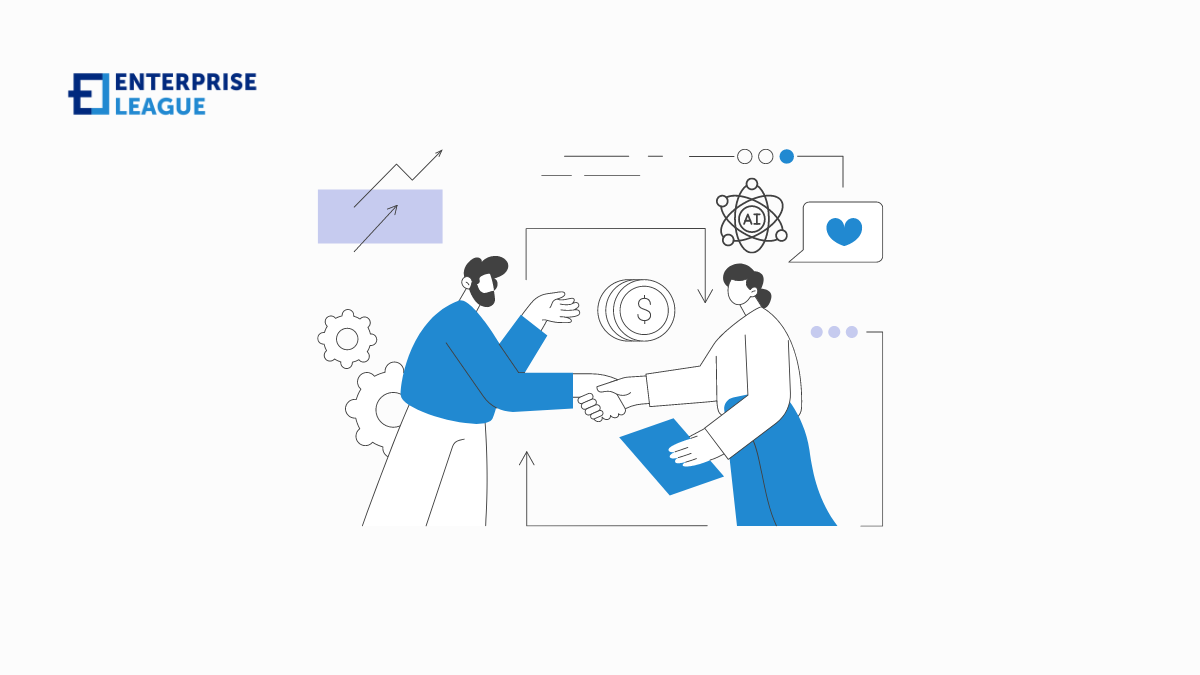Generative AI is more than a mere tool — it’s a game-changing technology, becoming a critical component of a society in which people and machines coexist.
Already having a tremendous influence in various industries, its potential in the B2B market is immense. Generative AI is changing the B2B market by improving process automation, efficiency, and customer experience.
Generative AI is different from other forms of AI. Unlike conventional AI systems that recognize patterns and forecast outcomes, generative AI platforms can generate new outputs based on the data it has been trained on. This means that generative AI can create unique materials, such as texts, images, audio, and more.
How does generative AI work?
Generative AI responds to natural language queries without requiring specialized coding skills. It creates new data using advanced algorithms instead of standard AI’s established rules and patterns.
This user-friendliness has opened up new possibilities and made generative AI more accessible to a broader audience. Generative AI can create items that are similar to the training data but remain unique.
How B2B marketers are using generative AI
While generative AI is still a new resource, B2B marketers worldwide are already having success with it. Here are the top ways marketing executives are using these technologies right now, as well as the results they are witnessing:
- Improving efficiency to concentrate on higher-value work (58%);
- Increasing content production in less time (57%);
- Creating optimized, engaging content relevant to the target audience (53%);
- Increasing a competitive advantage (35%).
Reasons why B2B marketers should use AI
- It enables users to produce customized content that is difficult to create otherwise.
- Generative AI can provide insights into customer demand and behavior, enhancing ad targeting.
- It has the potential to bridge the gap between human creativity and technology by producing surprising and accurate outcomes.
- Generative AI helps organizations become more competitive by recognizing clients’ needs. It can develop new content tailored to them.
- It can automate tasks such as advertising and lead creation. It allows marketing teams to concentrate on creativity and problem-solving.
How generative AI affects B2B marketing
Here’s how AI is transforming B2B marketing and opening up new opportunities.
Enhanced customer personalization
Personalization is a critical success factor in the B2B market. AI can help businesses evaluate vast amounts of data to gain insights into customer preferences. By employing this data, B2B enterprises can develop highly tailored client experiences. AI algorithms can enhance customer engagement and loyalty by suggesting personalized products, content, and improved communication.
Streamlining supply chain management
Predictive analytics for better decision-making
The capacity of generative AI to examine large datasets and uncover patterns provides predictive analytics for B2B firms. Decision-makers can make educated decisions by forecasting market trends, consumer behavior, and potential risks, reducing uncertainty, and capitalizing on opportunities.
Improved cybersecurity
Cybersecurity is a significant concern in the B2B sector. While generative AI plays a role in creating simulations or models that can test system robustness, anomaly detection algorithms, which can be either supervised or unsupervised by machine learning, are key in identifying irregular patterns in network traffic, user activity, and system records. This multifaceted approach to AI in cybersecurity allows B2B organizations to proactively identify and address potential security threats.
Competitive analysis and market research
Market research and competitor analysis are critical for staying ahead of the curve in the increasingly competitive B2B sector. Generative AI helps automate market research operations, analyze competitors’ strategies, and create new trends. This insight enables B2B firms to make data-driven decisions to maintain their competitive advantage.
Challenges of using generative AI in B2B marketing
While generative AI has significant advantages for B2B marketing, its application presents various hurdles firms must overcome. Some of the most significant obstacles to employing generative AI in B2B marketing are as follows.
Disputable accuracy
Generative AI models might not always produce content with the intended accuracy and quality. The produced material may have mistakes, inconsistencies, or a lack of tone and style, which might harm the brand’s reputation.
Ethical concerns
Generative AI can develop content that is very similar to human-generated material, posing ethical questions regarding the content’s authenticity and origin. To avoid deceit, B2B marketers should maintain transparency and specify when AI-generated content is used.
Over-reliance on AI
Over-reliance on generative AI in marketing tactics may result in losing human creativity and intuition. Successful B2B marketing needs a balance between AI technology and human knowledge to deliver appealing and targeted campaigns.
Legal issues
AI-generated material poses issues of copyright and intellectual property rights. B2B marketers must exercise caution when employing AI-generated content to prevent infringing on others’ copyrights or facing legal complications.
Impact on human jobs
Conclusion
B2B organizations can gain a competitive edge, stimulate innovation, and create more efficient and customer-centric experiences by using the potential of AI technology, ultimately moving the sector toward a more dynamic and prosperous future.
More must-read stories from Enterprise League:
- Common hiring mistakes that employers make and how to prevent them.
- Best marketing tools for startups that are worth trying.
- Warning signs of a terrible boss that everyone must be aware of.
- Learn how to deal with rude customers in a creative way.
- Smart ways to enhance the efficiency of your business.
Related Articles
14 unique business ideas with drones that guarantee a profit (2024)
If you are one of those that loves tech gadgets, we’ve made a list of 14 business ideas with drones that will inspire you to start a business in this field.
How mortgage workflow automation enhances loan officer efficiency
Embracing automation and its transformative impact allows loan officers to prioritize developing connections with borrowers and enhancing customer satisfaction.
26 best electrical equipment companies in 2024
Electrical equipment companies, in general, are companies working with products that produce, distribute, or use electrical energy.
14 unique business ideas with drones that guarantee a profit (2024)
If you are one of those that loves tech gadgets, we’ve made a list of 14 business ideas with drones that will inspire you to start a business in this field.
How mortgage workflow automation enhances loan officer efficiency
Embracing automation and its transformative impact allows loan officers to prioritize developing connections with borrowers and enhancing customer satisfaction.






